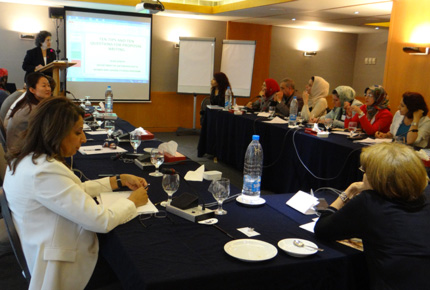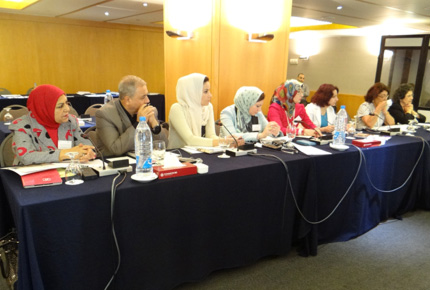The gender question in Iraq
The Institute for Women’s Studies in the Arab World at LAU holds a roundtable exploring the reality and expectations of gender research in Iraq.
Employing a broad, interdisciplinary framework perspective on gender relations the Institute for Women’s Studies in the Arab World (IWSAW) organized a roundtable on Gender Research in Iraq: Reality and Expectations on June 26. The initiative was sponsored by the Open Society Institute-International Women’s Program.
Despite the unstable security situation in both Iraq and Lebanon, and travel advisories for both countries, the event succeeded in bringing together academics and researchers from those countries, as well as Tunisia, Syria, Yemen and Japan, who also attended the three day international conference from 23-25 June, organized by IWSAW on Arab Countries in Transition: Gender Rights & Constitutional Reforms.
The debate comes on the heels of a recently implemented project, Gender Training for Iraqi Academics & Researchers, and aims to discuss the current status of gender research in the Arab world, with particular emphasis on Iraq. “The gender question, while many do not want to openly address it, still lurks beneath the surface of many of the socio-political problems of Middle Eastern societies,” points out Dr. Suad Joseph, distinguished professor of Anthropology and Women and Gender Studies at the University of California, Davis.
The roundtable participants discussed the challenges they face as researchers in studying gender. “One of the greatest obstacles is the language barrier—most of the available material on women and gender issues is either in English or other foreign languages, but not in Arabic,” says Dr. Hoda El-Sadda, professor of English and Comparative Literature at Cairo University and head of the Freedoms and Rights Committee in Egypt’s Constituent Assembly.
Another important issue that was raised was the necessity of strong proposal writing skills to attract research funding. As a remedy, Joseph held a workshop and shared her extensive experience in just that. Many of the attendees also felt that because the majority of research is funded by international agencies, it is implicitly expected to reflect the agency’s agenda and not necessarily targeted to the specific needs of each country.
Roundtable participant Dr. Noha Bayoumi, professor of French literature at the Lebanese University discussed the challenges faced by Lebanese researchers: “The importance of international and regional networking with research centers, universities and NGOs is essential for us to further our research.”
Gaining the buy-in of academics and society with respect to integrating gender in the curriculum was another obstacle that was disclosed. Dr. Nahla El-Nadawi, professor at the University of Baghdad’s college of Education for Women presented an overview of women and gender issues in Iraq. According to El-Nadawi, “The concept of gender is suspiciously viewed by some as a trend imposed by the international community and UN agencies—at the same time, it is because of the pressure of these international lobbies that Iraq has accepted to discuss women’s issues and to abide by a quota in parliament. Otherwise, Iraq is not yet ready to give women much power.”
“Generating research in Arabic is essential at this point to fill the gender gap on research in the Arab world and bring attention to these issues,” stresses Dr. Samira Aghacy, interim director of IWSAW.
More
Latest Stories
- SOE Launches its Distinguished Scholar Visiting Program with International Guest Dr. Feras Batarseh
- LAU Nursing Camp Opens Eyes, Hearts and Futures
- Meet Dr. Zeina Khouri-Stevens, Executive Vice President for Health Services
- LAU Family Medicine Graduates to Benefit from a Partnership With Nova Scotia
- AKSOB Assistant Professor Shares Her Vision for the Future of Learning
- LAU Simulation Models Celebrate 20 Years of Learning, Leadership and Service
- The School of Engineering Hosts the Lebanese Electromagnetics Day
- LAU Stands Out on the Sustainability Scores



